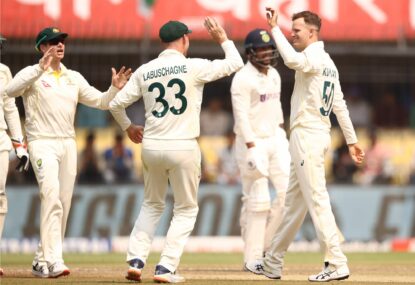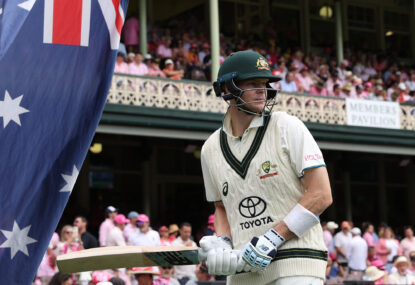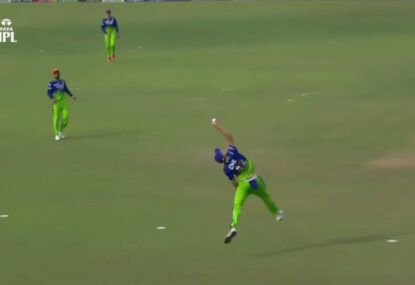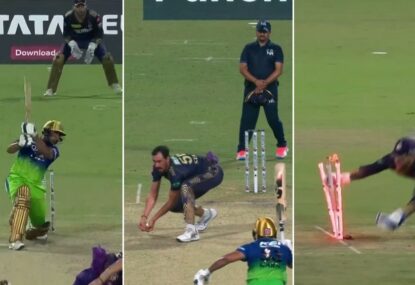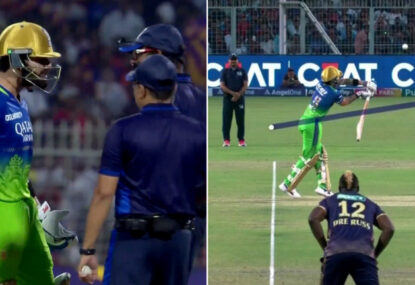I was watching a documentary recently about the FBI cleaning up the Mafia in the 1980s, and the conversation as described between an agent and the arrested racketeer stuck in my mind.
The agent asked the Mafioso why he kept running numbers when he knew the FBI was going to keep chasing him. The crim said gambling is legal and pointed with his elbow to two raindrops on the police car window and asked the agent which one would get to the sill first – just pick one!
The agent said the left and the crim said, “I’ll give you odds of 10:1”.
The agent replied that he didn’t gamble, to which the crim responded, “Maybe, but millions do. As to why I keep doing it, smart odds help me make money, smart thinking turns them completely in my favour”.
When asked what that meant, the Mafioso said, “If I could free my hand I’d run a finger down under the raindrop on the right all the way to the sill. Then I’d have a certainty!”.
Apocryphal maybe, but no less instructive.
People have always bet on cricket. As far back as the 18th century, the British aristocracy had wagers on the games they organised, but there isn’t much discussion on match-fixing until around 1820 when the idea that the game was for ‘gentlemen’, albeit with the need for lower-class professionals.
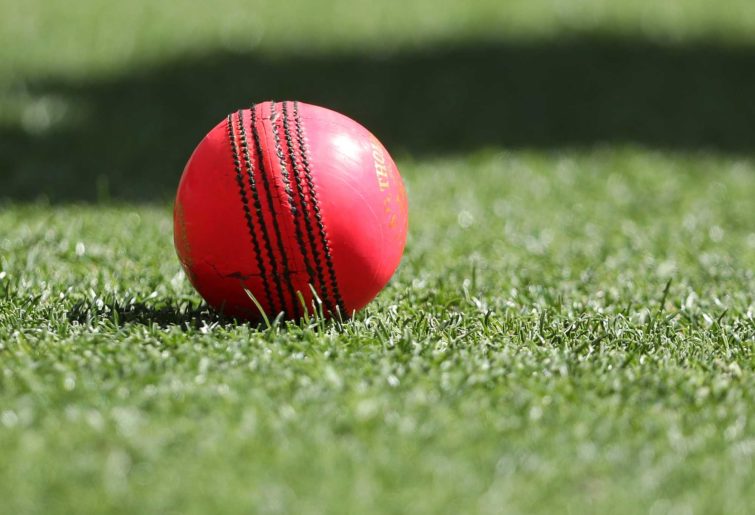
(Photo by Morne de Klerk/Getty Images)
Those professionals were easy targets for the bookmakers as the young players were easily convinced they were undervalued and naturally underpaid and could earn a hundred times more for doing what the best players of the day were doing all the time. Of course impressionable, gullible players from small villages were eager to make not only a name for themselves but also financially set themselves for life and were convinced to never question who else was getting paid to perform on cue.
It certainly wasn’t ‘Silver Billy’ Beldham, the 1820s Steve Smith or Virat Kohli, who knocked back big money for fixing games between counties from bookies openly operating at county grounds, including Lord’s. The easy games to fix apparently were three, four or five-a-side games, with the ambitious bookies taking on XI-a-side matches.
Sussex player William Lambert, however, was nearly as big a star as Beldham, having been the first player to score a century in each innings of a first-class game at Lord’s. He was found guilty of match-fixing in 1817 and banned for life from Lord’s! That was every bit the cricketing scandal as Hansie Cronje and Mohammad Azharuddin 180 years later, prompting cricket administrators to seriously look at systemic match-fixing to the point of banning bookies from Lord’s and reducing the influence of high-stakes gambling through the 1820s.
Of course, betting didn’t stop and was still evident through to the celebrated 1980s incident where Australian players Dennis Lillee and Rod Marsh sent the bus driver around the Headingley ground to the betting tent to put a tenner at 500:1 on an improbable English win. That of course was a pure gamble on the game and didn’t carry connotations of match-fixing, but it highlights that gambling was still inextricably linked to cricket.
Qasim Umar is a Kenyan-born cricketer who played 26 Tests and 31 ODIs for Pakistan between 1983 and 1987, and he spoke out about match and spot-fixing, which he asserted was rife at the time. He also made claims of recreational and performance-enhancing drug use in the sport. He openly admitted tp accepting gifts for underperforming in matches and even sensationally accused fellow teammates of accepting the services of prostitutes as payment for their part in spot-fixing.
Umar was banned from the national team in 1987. This interesting character emigrated to Manchester, UK, after his life ban, but weirdly has a bridge flyover in Karachi named after him, many believe by political admirers in recognition of his vehement criticisms of his captain at the time and now Prime Minister Imran Khan!
Those accusations and admissions from Umar certainly started to call into question what was in some countries an open secret. Players knew of players who might possibly have been involved but wouldn’t name names because of the power of the individuals in question and fear of threats by gambling organisations.
Despite the fines handed to Shane Warne and Mark Waugh in the mid-1990s for providing weather information to a bookie, it really wasn’t until around the turn of the 21st century that cricket administrators openly started to address the match and spot-fixing in national first-class cricket and internationals.
Pakistan was considered a hot-bed of match and spot-fixing, but the cricketing world was rocked by the implication of both South African and Indian captains Hansie Cronje and Mohammad Azharuddin. This wasn’t a player underperforming; this called into question the actual results of games. The bitter taste remains long after Cronje’s death in 2002 amid a myriad of conspiracy theories and Azharuddin’s life ban, with fans of all countries questioning those iconic sporting moments that develop every fan’s love for a sport.
Was that close finish a pure sporting moment or the result of a cheating captain exerting pressure on certain susceptible players?
There has been a raft of cases from almost all cricketing countries since, including both match and spot-fixing. There have even been jail terms, which many believe to be unnecessarily harsh.
Is it too harsh?
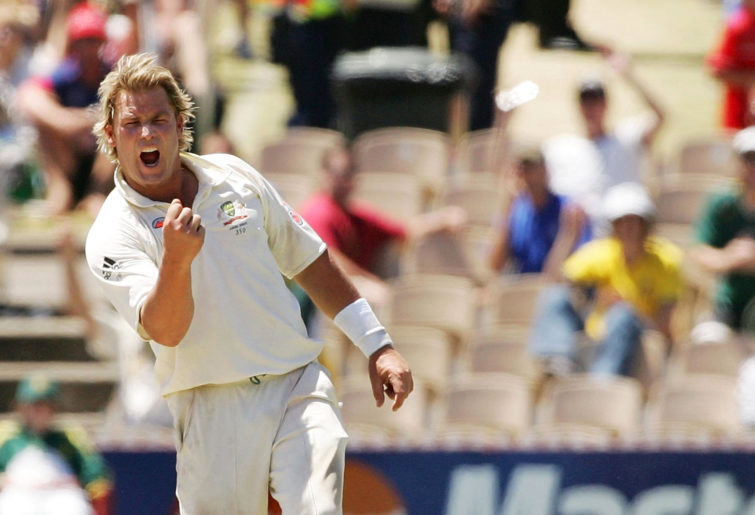
(Photo by Hamish Blair/Getty Images)
I can think of many players jailed for spot-fixing, with the highest-profile case being the 2010 Pakistani spot-fixing in England that had Pakistani captain Salman Butt and bowlers Mohammad Amir and Mohammad Asif receiving jail terms.
This followed the four-month jail term of Essex County player Mervyn Westfield for spot-fixing in a 2009 county game, believed to be set up by Pakistani and Essex spinner Danish Kaneria. Arrested in 2010 by police investigating “match irregularities”, Kaneria was cleared of allegations but was found guilty by an ECB disciplinary panel and banned for life, a decision which the Pakistan Cricket Board agreed to abide by.
Kaneria appealed the decision in 2013 but the ban was upheld. In October 2018 he finally admitted his involvement in the spot-fixing scandal.
“I want to apologise to Mervyn Westfield, my Essex teammates, my Essex cricket club, my Essex cricket fans. I say sorry to Pakistan,” Kaneria said. “If the ECB and ICC and other bodies would give me a second chance, I can help to educate young people in cricket, teach them that if you do wrong you are finished like me.”
Interesting plea after nearly ten years of denial!
We have seen a disproportionate number of players from Afghanistan, Bangladesh, Pakistan, India and Sri Lanka involved in spot and match-fixing in the last decade right through to world No.1 all-rounder Bangladeshi Shakib Al Hasan being banned for 12 months for merely failing to report an approach from a bookie.
Are these countries more affected by gambling or more serious about removing it?
As far as the players involved, do they deserve a second chance?
Shakib certainly does; his ‘offence’ wasn’t actually cheating. It seems that convicted cheating players in Asian countries receive those chances in their own countries but abide by the harsh penalties meted out in England, Australia or New Zealand, with many players who are still of playing age after their bans being welcomed back to their national teams or given coaching roles and exerting influence on the next generation, as Kaneria asked for in that quote.
Are players welcomed back because the public doesn’t believe the offence is really that serious, or is it that they can’t bear the thought of their team being deprived of ‘available’ proven talent?
Is it a case of the penalty is served, so they have a right to go back to work?
Is it that they have seen so many life bans overturned that they don’t really believe the veracity of the evidence which initially convicted some players?
Is it that some players and supporters don’t see the difference between match-fixing and sporting declarations to try and provide a result in a match?
Sri Lanka introduced tough penalties for match-fixing and tightened sports betting restrictions in November 2019 in a bid to stamp out the corruption that has tainted the country’s cricket team. That is commendable, but the implementation and standing behind penalties meted out is the true indication as to the real desire to clean up our sport.
I abhor that my favourite sport is mired in corruption.
It also makes me frustrated that all sporting nations talk tough about the desire to rid the sport of corruption while displaying sports betting agencies advertising at grounds and receiving payment for stalls and stands at grounds for punters to bet on who may score the first hundred or take the first wicket.
That hypocrisy not only sends the wrong message to current players but also the young future players who believe cricket’s administrators condone spot betting. Is it a long bow to draw that those desensitised to spot betting really don’t see the problem with spot-fixing? If spot betting is legal, then isn’t it just a matter of semantics whether that spot bet is for a no-ball bowled on the third ball of the 12th over or the ‘currently legitimate’ first wicket-taker?
I’m not naïve enough to believe there’s a simple fix to an age-old problem, but are the game’s administrators truly serious enough to stop accepting gambling revenue to show players that they shouldn’t either? While that contradiction persists it provides the environment for organised crime to find willing participants to be the finger run down under that raindrop on the car window.
Right now, in my opinion, administrators from the ICC down are really only putting out spot fires, not curtailing match and spot-fixing.































































































